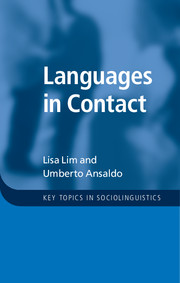Book contents
- Frontmatter
- Contents
- List of figures
- List of tables
- Preface
- Acknowledgements
- List of abbreviations
- 1 Perspectives on contact
- 2 Contact and code choice
- 3 Contact and creole formation
- 4 Contact and language evolution
- 5 Contact and ecology
- 6 Contact and shift
- 7 Contact and globalisation
- 8 Reflections and future directions
- References
- Index
3 - Contact and creole formation
Published online by Cambridge University Press: 05 November 2015
- Frontmatter
- Contents
- List of figures
- List of tables
- Preface
- Acknowledgements
- List of abbreviations
- 1 Perspectives on contact
- 2 Contact and code choice
- 3 Contact and creole formation
- 4 Contact and language evolution
- 5 Contact and ecology
- 6 Contact and shift
- 7 Contact and globalisation
- 8 Reflections and future directions
- References
- Index
Summary
INTRODUCTION
The question of why and how speakers in contact have, in specific contexts, created entire new languages with unique grammatical features occupies an important place in the field of language contact. The diversity of approaches this question has received, and the complexity of creole contexts itself, has led to a lively and at times controversial debate in creole studies. Some of the fundamental questions that creolists have grappled with include the following.
i. Why do contact languages, and especially creoles, arise in the first place?
ii. How are the new grammatical systems arrived at?
iii. Which original languages of the contact situation influenced the new varieties most and why?
In attempting to answer these and other complex questions, a number of proposals have been put forward, including the following.
i. Creole grammars reflect the expressions of innate constraints produced of sheer communicative necessity.
ii. Creoles can be seen as continuations or dialects of their lexifier (superstrate) languages.
iii. Creole grammars are based on their substrate languages.
iv. Creoles are instances of second language (L2) transfer.
While some of these claims are compatible with each other, others are somewhat exclusive, a situation that has led to a number of controversies. This chapter is devoted to explaining and discussing these different positions. It is important to realise that what essentially distinguishes the different approaches is a matter of focus. In order to clarify this, the discussion in this chapter proceeds by focusing in the following sections on the role of Universal Grammar, the continuity of lexifier influences, the role of substrate grammars and language transfer in a plurilingual context. In the last section we discuss the more substantial arguments offered in favour of and against each stance. More recent theoretical developments in the field, including the notion of hybridity and evolutionary approaches to contact language formation (CLF), are discussed in Chapter 4.
FOCUS ON UNIVERSAL GRAMMAR
A number of theoretical approaches share the assumption that creole languages emerge out of pidgin languages through a process of nativisation. This position was explicitly taken by Hall (1966: xiv), who developed the notion of the pidgin–creole life cycle. In this model, a pidgin is regarded as having emerged as a vehicle of communication amongst people who lacked a common language.
- Type
- Chapter
- Information
- Languages in Contact , pp. 59 - 79Publisher: Cambridge University PressPrint publication year: 2015



